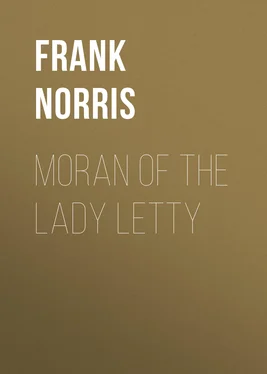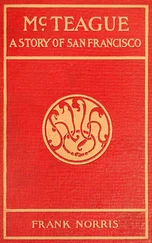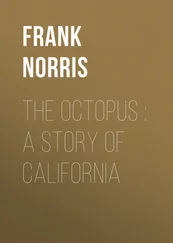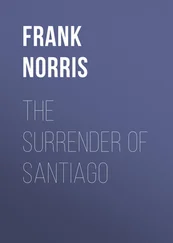Frank Norris - Moran of the Lady Letty
Здесь есть возможность читать онлайн «Frank Norris - Moran of the Lady Letty» — ознакомительный отрывок электронной книги совершенно бесплатно, а после прочтения отрывка купить полную версию. В некоторых случаях можно слушать аудио, скачать через торрент в формате fb2 и присутствует краткое содержание. Жанр: Прочие приключения, Прочие приключения, literature_19, foreign_antique, foreign_prose, на английском языке. Описание произведения, (предисловие) а так же отзывы посетителей доступны на портале библиотеки ЛибКат.
- Название:Moran of the Lady Letty
- Автор:
- Жанр:
- Год:неизвестен
- ISBN:нет данных
- Рейтинг книги:3 / 5. Голосов: 1
-
Избранное:Добавить в избранное
- Отзывы:
-
Ваша оценка:
- 60
- 1
- 2
- 3
- 4
- 5
Moran of the Lady Letty: краткое содержание, описание и аннотация
Предлагаем к чтению аннотацию, описание, краткое содержание или предисловие (зависит от того, что написал сам автор книги «Moran of the Lady Letty»). Если вы не нашли необходимую информацию о книге — напишите в комментариях, мы постараемся отыскать её.
Moran of the Lady Letty — читать онлайн ознакомительный отрывок
Ниже представлен текст книги, разбитый по страницам. Система сохранения места последней прочитанной страницы, позволяет с удобством читать онлайн бесплатно книгу «Moran of the Lady Letty», без необходимости каждый раз заново искать на чём Вы остановились. Поставьте закладку, и сможете в любой момент перейти на страницу, на которой закончили чтение.
Интервал:
Закладка:
The brown sweater led the way to a sailors’ boarding-house hard by. The rear of the place was built upon piles over the water. But in front, on the ground floor, was a barroom.
“Rum an’ gum,” announced the brown sweater, as the two came in and took their places at the bar.
“Rum an’ gum, Tuck; wattle you have, sir?”
“Oh—I don’t know,” hesitated Wilbur; “give me a mild Manhattan.”
While the drinks were being mixed the brown sweater called Wilbur’s attention to a fighting head-dress from the Marquesas that was hung on the wall over the free-lunch counter and opposite the bar. Wilbur turned about to look at it, and remained so, his back to the barkeeper, till the latter told them their drinks were ready.
“Well, mate, here’s big blocks an’ taut hawse-pipes,” said the brown sweater cordially.
“Your very good health,” returned Wilbur.
The brown sweater wiped a thin mustache in the hollow of his palm, and wiped that palm upon his trouser leg.
“Yessir,” he continued, once more facing the Marquesas head-dress. “Yessir, they’re queer game down there.”
“In the Marquesas Islands, you mean?” said Wilbur.
“Yessir, they’re queer game. When they ain’t tattoin’ theirselves with Scripture tex’s they git from the missionaries, they’re pullin’ out the hairs all over their bodies with two clam-shells. Hair by hair, y’ understan’?”
“Pull’n out ‘er hair?” said Wilbur, wondering what was the matter with his tongue.
“They think it’s clever—think the women folk like it.”
Wilbur had fancied that the little man had worn a brown sweater when they first met. But now, strangely enough, he was not in the least surprised to see it iridescent like a pigeon’s breast.
“Y’ ever been down that way?” inquired the little man next.
Wilbur heard the words distinctly enough, but somehow they refused to fit into the right places in his brain. He pulled himself together, frowning heavily.
“What—did—you—say?” he asked with great deliberation, biting off his words. Then he noticed that he and his companion were no longer in the barroom, but in a little room back of it. His personality divided itself. There was one Ross Wilbur—who could not make his hands go where he wanted them, who said one word when he thought another, and whose legs below the knee were made of solid lead. Then there was another Ross Wilbur—Ross Wilbur, the alert, who was perfectly clear-headed, and who stood off to one side and watched his twin brother making a monkey of himself, without power and without even the desire of helping him.
This latter Wilbur heard the iridescent sweater say:
“Bust me, if y’ a’n’t squiffy, old man. Stand by a bit an’ we’ll have a ball.”
“Can’t have got—return—exceptionally—and the round table—pull out hairs wi’ tu clamsh’ls,” gabbled Wilbur’s stupefied double; and Wilbur the alert said to himself: “You’re not drunk, Ross Wilbur, that’s certain; what could they have put in your cocktail?”
The iridescent sweater stamped twice upon the floor and a trap-door fell away beneath Wilbur’s feet like the drop of a gallows. With the eyes of his undrugged self Wilbur had a glimpse of water below. His elbow struck the floor as he went down, and he fell feet first into a Whitehall boat. He had time to observe two men at the oars and to look between the piles that supported the house above him and catch a glimpse of the bay and a glint of the Contra Costa shore. He was not in the least surprised at what had happened, and made up his mind that it would be a good idea to lie down in the boat and go to sleep.
Suddenly—but how long after his advent into the boat he could not tell—his wits began to return and settle themselves, like wild birds flocking again after a scare. Swiftly he took in the scene. The blue waters of the bay around him, the deck of a schooner on which he stood, the Whitehall boat alongside, and an enormous man with a face like a setting moon wrangling with his friend in the sweater—no longer iridescent.
“What do you call it?” shouted the red man. “I want able seamen—I don’t figger on working this boat with dancing masters, do I? We ain’t exactly doing quadrilles on my quarterdeck. If we don’t look out we’ll step on this thing and break it. It ain’t ought to be let around loose without its ma.”
“Rot that,” vociferated the brown sweater. “I tell you he’s one of the best sailor men on the front. If he ain’t we’ll forfeit the money. Come on, Captain Kitchell, we made show enough gettin’ away as it was, and this daytime business ain’t our line. D’you sign or not? Here’s the advance note. I got to duck my nut or I’ll have the patrol boat after me.”
“I’ll sign this once,” growled the other, scrawling his name on the note; “but if this swab ain’t up to sample, he’ll come back by freight, an’ I’ll drop in on mee dear friend Jim when we come back and give him a reel nice time, an’ you can lay to that, Billy Trim.” The brown sweater pocketed the note, went over the side, and rowed off.
Wilbur stood in the waist of a schooner anchored in the stream well off Fisherman’s wharf. In the forward part of the schooner a Chinaman in brown duck was mixing paint. Wilbur was conscious that he still wore his high hat and long coat, but his stick was gone and one gray glove was slit to the button. In front of him towered the enormous red-faced man. A pungent reek of some kind of rancid fat or oil assailed his nostrils. Over by Alcatraz a ferry-boat whistled for its slip as it elbowed its way through the water.
Wilbur had himself fairly in hand by now. His wits were all about him; but the situation was beyond him as yet.
“Git for’d,” commanded the big man.
Wilbur drew himself up, angry in an instant. “Look here,” he began, “what’s the meaning of this business? I know I’ve been drugged and mishandled. I demand to be put ashore. Do you understand that?”
“Angel child,” whimpered the big man. “Oh, you lilee of the vallee, you bright an’ mornin’ star. I’m reely pained y’know, that your vally can’t come along, but we’ll have your piano set up in the lazarette. It gives me genuine grief, it do, to see you bein’ obliged to put your lilee white feet on this here vulgar an’ dirtee deck. We’ll have the Wilton carpet down by to-morrer, so we will, my dear. Yah-h!” he suddenly broke out, as his rage boiled over. “Git for’d, d’ye hear! I’m captain of this here bathtub, an’ that’s all you need to know for a good while to come. I ain’t generally got to tell that to a man but once; but I’ll stretch the point just for love of you, angel child. Now, then, move!”
Wilbur stood motionless—puzzled beyond expression. No experience he had ever been through helped in this situation.
“Look here,” he began, “I—”
The captain knocked him down with a blow of one enormous fist upon the mouth, and while he was yet stretched upon the deck kicked him savagely in the stomach. Then he allowed him to rise, caught him by the neck and the slack of his overcoat, and ran him forward to where a hatchway, not two feet across, opened in the deck. Without ado, he flung him down into the darkness below; and while Wilbur, dizzied by the fall, sat on the floor at the foot of the vertical companion-ladder, gazing about him with distended eyes, there rained down upon his head, first an oilskin coat, then a sou’wester, a pair of oilskin breeches, woolen socks, and a plug of tobacco. Above him, down the contracted square of the hatch, came the bellowing of the Captain’s voice:
“There’s your fit-out, Mister Lilee of the Vallee, which the same our dear friend Jim makes a present of and no charge, because he loves you so. You’re allowed two minutes to change, an’ it is to be hoped as how you won’t force me to come for to assist.”
Читать дальшеИнтервал:
Закладка:
Похожие книги на «Moran of the Lady Letty»
Представляем Вашему вниманию похожие книги на «Moran of the Lady Letty» списком для выбора. Мы отобрали схожую по названию и смыслу литературу в надежде предоставить читателям больше вариантов отыскать новые, интересные, ещё непрочитанные произведения.
Обсуждение, отзывы о книге «Moran of the Lady Letty» и просто собственные мнения читателей. Оставьте ваши комментарии, напишите, что Вы думаете о произведении, его смысле или главных героях. Укажите что конкретно понравилось, а что нет, и почему Вы так считаете.












